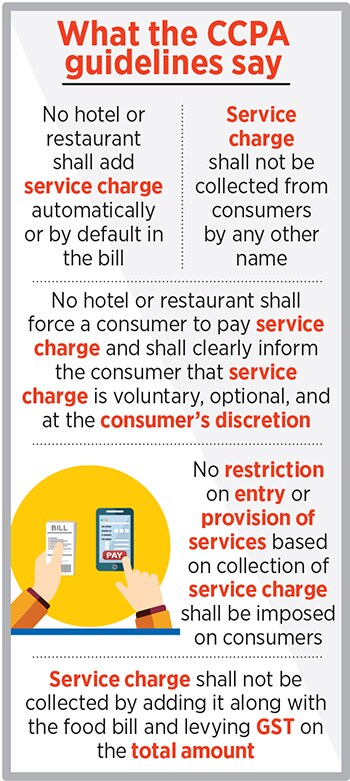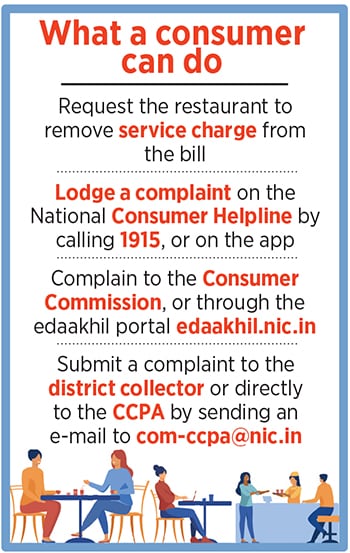Eating out: Service charge mandatory or optional? The debate continues
Restaurateurs stick to the legality of service charge and will continue to levy it, while consumer forums insist the new guidelines hold the force of law


Chances are that the next time you eat out you’ll end up with scrumptious food, but also dollops of confusion. Not over how you want your steak done, or how spicy your butter chicken should be, but over a set of guidelines that will most likely affect how much you should pay at the end of your meal.
Earlier this week, the Central Consumer Protection Authority (CCPA), which was set up by the Ministry of Consumer Affairs, Food and Distribution in July 2020, announced five major guidelines that say no restaurant or hotel shall add service charge by default or by rechristening it, neither can they force a customer to pay it or restrict services based on it. Last, it says, a service charge shall not be collected by adding it along with the food bill and levying a GST on it.
The guidelines come a month after the department of consumer affairs, on June 2, held a meeting with restaurant associations and consumer forums and promised to come up with a “robust framework" to strengthen another set of guidelines it had rolled out in 2017 to govern the subject of service charge. With its July announcement, the pot that had been simmering for a few years has started to roil.
The National Restaurant Association of India (NRAI), which represents over 500,000 restaurants in the country, has remained strident in its defence of the service charge, saying it isn’t anything illegal and its members will continue with it. “Our stance was very clear: If someone wasn"t happy with the service, we’d anyway take it off the bill," says Sagar Daryani, vice-president, NRAI, and CEO and co-founder of Wow! Momo. “The CCPA is creating confusion in the consumer’s mind because ultimately it’s only saying that you can ask the restaurants to take it off if you want. I read media reports saying service charge has been banned. Nothing has been banned," he reiterates.
In its press release, NRAI mentions that the legality of levying a service charge has been upheld at various points by the Supreme Court and the high courts as well as bodies like the National Consumer Disputes Redressal Commission. It cites the 2001 order of the Monopolies and Restrictive Practices Commission in the SS Ahuja vs Pizza Express case in which it said: “Levy of service charges cannot be questioned in law…"
 “Our legal team has said these guidelines aren’t any stronger than the 2017 guidelines, which were advisories," says Daryani. “If they are enforced, we will challenge them in appropriate forums."
“Our legal team has said these guidelines aren’t any stronger than the 2017 guidelines, which were advisories," says Daryani. “If they are enforced, we will challenge them in appropriate forums."
But Shirish Deshpande, advocate and chairman of the Mumbai Grahak Panchayat (MGP), one of the stakeholders in the talks with the government, disagrees and insists that the new guidelines are far sharper than their 2017 counterparts and hold the force of law. “The difference between the new and the old guidelines is that, in the intervening period, the Consumer Protection Act 1986 was replaced with the Consumer Protection Act 2019, which came into effect in July 2020. It created a new statutory body, the CCPA, which has been empowered by the Parliament to take cognisance of the unfair trade practices," says Deshpande. “The guidelines issued by the CCPA have a statutory force under Section 18 (2)(l) of the act mandating it to issue guidelines to protect consumer interest."
“Don’t go by the word guidelines," adds Deshpande. “There are multiple Supreme Court judgments that say even guidelines have the force of law if they are issued out of the provisions of any statute. Violation of the 2017 guidelines didn’t call for any action, but the new ones have to be followed in letter and spirit."
With both sides refusing to budge and preparing to slug it out legally, it’s evident that we haven’t yet heard the last word.
For most restaurateurs, the debate over service charge stems from its flawed understanding of the concept. It’s not something that counts towards a restaurant’s revenue, they say, but is a variable component of the wages of their staff. “We are not fighting for ourselves, but for the rights of our employees," says Daryani.
Back in the day, says an industry insider, staff members of large hospitality chains wouldn’t even collect salaries for a few months since the generous tips would make up for it. While the volume has reduced considerably now, it could range anywhere between 30 and 100-200 percent of their salaries depending on the nature of the restaurant, with the fine-dining ones on the higher end. Which is why the move is looked upon as labour-unfriendly by the fraternity.

“If it is indeed removed, most restaurants will have to make up for the shortfall, but we don’t have the profitability to do that," says AD Singh, founder and managing director of the Olive Group of Restaurants, in an email. “This would cripple the industry that is just trying to recover from the huge setbacks suffered during the pandemic." According to a study done by consulting firm Technopak, around 2.5 million people working in the F&B industry lost their jobs during the pandemic.
While the hoteliers base their arguments on staff-centricity, consumer forums dial their focus on to the customer. “We aren’t quibbling with the charges of the food because that’s the restaurants’ prerogative," says Deshpande of MGP. “But leave it to us to decide how much we should tip or whether we should tip at all."
When the service charge is paid, says an F&B consultant who spoke on condition of anonymity, it either goes to the restaurant account if paid by card, or to the cashier if paid by cash, and is distributed either fortnightly or monthly. “It isn’t directly going to the waiter who’s served you well. There is a control factor involved with service charge," says the consultant who has worked with top F&B brands in the country.
Besides, says Deshpande, a lot of hospitality entrepreneurs argue that since the levy of 10 percent service charge is clearly mentioned in the menu and around the restaurant, it is a tacit agreement by the diner to pay it once s/he places an order. “According to the fundamentals of the Contract Act, a contract has to be fair and equitable," adds Deshpande. “These terms are one-sided, dictated by the restaurateurs and, hence, not sustainable in law."

Why can’t restaurants let customers decide what to pay for the service? Because, say restaurateurs, India is yet to mature on the tipping front. “The concept of service charge was started in India because the tipping standards were typically very low," says Singh of the Olive Group.
Gauri Devidayal, co-founder of the Food Matters Group that owns Mumbai fine-dining eatery The Table, cafe Mag Street Cafe and a clutch of cloud kitchens, takes the argument a step further and explains there is a fundamental difference between service charge and tipping, terms that are often used interchangeably. Service charge isn’t a component related to the price of food, but of hospitality, says Devidayal, and is split among both the front- and back-of-house staff. Tipping is a payment over and above and is at the discretion of the diner. “It’s still optional," she says.
 In 2016, Devidayal scrapped the service charge levied at The Table, but absorbed it into the menu with a 10 percent price hike. A prime global exponent of such ‘hospitality included’ pricing was US restaurateur Danny Meyer, one of the country’s best known and the founder of the Union Square Hospitality Group, who announced in 2015 that he would gradually eliminate tipping. In July 2020, when the group reopened after the pandemic (in which it had taken a battering and laid off 95 percent of its staff), The New York Times reported that Meyer was abandoning the policy and reverting to tipped wages.
In 2016, Devidayal scrapped the service charge levied at The Table, but absorbed it into the menu with a 10 percent price hike. A prime global exponent of such ‘hospitality included’ pricing was US restaurateur Danny Meyer, one of the country’s best known and the founder of the Union Square Hospitality Group, who announced in 2015 that he would gradually eliminate tipping. In July 2020, when the group reopened after the pandemic (in which it had taken a battering and laid off 95 percent of its staff), The New York Times reported that Meyer was abandoning the policy and reverting to tipped wages.
Devidayal, too, returned to a separate service charge tab in the bill while reopening post-Covid, because her guests preferred to see what they were paying as service charge. “The current process of showing 10 percent on the bill is actually more transparent," says Devidayal. “If it’s not shown in the bill, it will be built into the menu pricing, because it’s not optional. To ask us to waive service charge is akin to asking us to reduce the price of fries by 50 percent because the customer doesn’t like it."
Besides, India is a price-sensitive country, adds Singh of Olive, and higher rates, when the service charge is incorporated into the menu price, can lead to customer loss for restaurants. The restaurateurs also point to global tipping conventions–ranging from 10 percent in countries like the UK and Singapore, and even higher in the US–and the levy of convenience fees across several Indian service platforms, including the IRCTC for the railways, which is owned by the government. “Why target the restaurant industry?" asks Daryani.
“It’s weak logic," argues the consultant who spoke anonymously. “It’s like telling the cop that one fellow jumped the signal, so allow me to do so as well. In spirit, it’s not right. Plus, pricing is a customer habit. It might take the customer some time to get used to, but they will soon be back."
“It’s a battle between two sides that have valid arguments," says Ankur Bisen, senior partner and head, consumer, food and retail of Technopak. In an industry that has been ravaged during Covid and increasingly polarised since–where top restaurateurs are finally seeing revival while a number of standalone restaurants have either shut shop or are struggling to survive–no hotelier would let go of any opportunity that brings in extra money. “The opposing camp comes from a purist consumer rights protection stand. And they aren’t wrong either," says Bisen.
Where does the customer go amid this? The government has established a grievance redressal mechanism for aggrieved diners to complain with CCPA, collector or the consumer courts should restaurants continue to levy a service charge, but, says the consultant, “it will split up complaints on a case-to-case basis and leave it to the customers to fight it out". And it will lead to a never-ending loop of back and forth till the stakeholders come up with a shared path ahead in the form of clear legal directives.
Until then, diners can only wait and watch.
First Published: Jul 08, 2022, 13:00
Subscribe Now